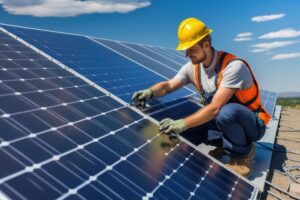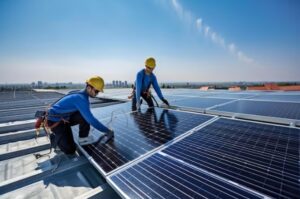Solar Panel Installation
Solar energy, often touted as the future of sustainable power, has gained significant attention in recent years. As the world grapples with environmental challenges and seeks alternative energy sources, harnessing the power of the sun through solar panel installation has emerged as a viable solution. In this article, we will delve into the intricacies of solar panel installation, exploring its advantages, the types of panels available, the installation process, and debunking common myths.
Advantages of Solar Panel Installation
Reduced Electricity Bills
One of the primary benefits of solar panel installation is the significant reduction in electricity bills. By generating your electricity, you not only become less dependent on traditional energy sources but also save money in the long run.
Environmentally Friendly
Solar energy is a clean, renewable resource that produces minimal pollution. Choosing solar power contributes to a greener planet by reducing the carbon footprint associated with conventional energy production.
Low Maintenance Costs
Contrary to common misconceptions, solar panels have low maintenance costs. With minimal moving parts, they require little attention once installed. Regular cleaning and occasional checks ensure optimal performance.
Types of Solar Panels
Monocrystalline
Known for their efficiency, monocrystalline panels are made from a single crystal structure. They are space-efficient and offer high energy conversion rates.
Polycrystalline
Polycrystalline panels are more affordable and easier to produce. While slightly less efficient than monocrystalline panels, they remain a popular choice for residential installations.
Thin-film
Thin-film panels are lightweight and flexible, making them suitable for unconventional surfaces. Although less efficient, they are cost-effective and adaptable.
Steps in Solar Panel Installation
Site Assessment
Before installing solar panels, a thorough assessment of the site is crucial. Factors like sunlight exposure, shading, and roof condition play a vital role in determining the feasibility of installation.
Obtaining Necessary Permits
Navigating local regulations and obtaining the required permits is a crucial step in the installation process. Compliance ensures a smooth and legal installation.
Choosing the Right Solar Panels
Selecting the appropriate type of solar panels based on energy needs and budget is essential. Consulting with a professional can help in making informed decisions.
Installation Process
The actual installation involves mounting the panels, connecting the electrical components, and ensuring the system’s seamless integration with the existing electrical setup.
DIY vs. Professional Installation
Pros and Cons of DIY Installation
While some enthusiasts opt for a do-it-yourself approach, it comes with challenges. Saving on installation costs is a pro, but lack of expertise may lead to suboptimal performance.
Benefits of Professional Installation
Professional installers bring experience and expertise to the table. They ensure proper installation, compliance with regulations, and optimal system performance.
Factors Affecting Solar Panel Efficiency
Placement and Orientation
The efficiency of solar panels is influenced by their placement and orientation. Maximizing exposure to sunlight enhances energy production.
Quality of Solar Panels
Investing in high-quality solar panels is crucial for long-term efficiency. Understanding the specifications and warranties is essential for making informed choices.
Maintenance and Cleaning
Regular maintenance, including cleaning and inspections, ensures the longevity and efficiency of solar panels.
Government Incentives and Rebates
Overview of Available Incentives
Governments worldwide offer incentives to promote solar energy adoption. These incentives may include tax credits, rebates, and feed-in tariffs.
How to Avail Government Rebates
Navigating the bureaucratic process of claiming government rebates requires attention to detail. Consulting with professionals can simplify the application process.
Common Myths About Solar Panel Installation
Solar Panels Are Too Expensive
While the initial investment might seem high, the long-term savings on electricity bills often outweigh the costs. Additionally, government incentives and falling solar panel prices make it more accessible.
Solar Energy Is Only Effective in Sunny Climates
Solar panels can generate power even in overcast conditions. While they perform optimally in sunny climates, they are still a viable option in less sunny regions.
Installation Is Complex and Time-Consuming
Professional installers streamline the process, making it efficient and hassle-free. DIY enthusiasts can succeed with proper research and guidance.
Real-Life Success Stories
Highlighting individuals or businesses that have successfully adopted solar energy can inspire others to make the switch. These success stories underscore the positive impact on both the environment and financial savings.
Future of Solar Energy
Technological Advancements
Ongoing research and development continue to improve solar technology. Advancements in efficiency, storage, and aesthetics make solar energy an increasingly attractive option.
Increasing Adoption Globally
The global shift towards sustainable energy is evident in the increasing adoption of solar power. Countries worldwide are investing in solar infrastructure, signaling a promising future.
Conclusion
Solar panel installation offers a myriad of benefits, from cost savings to environmental conservation. Understanding the types of panels, the installation process, and debunking common myths is crucial for anyone considering this sustainable energy option. As technology advances and global awareness grows, the future of solar energy looks bright.


